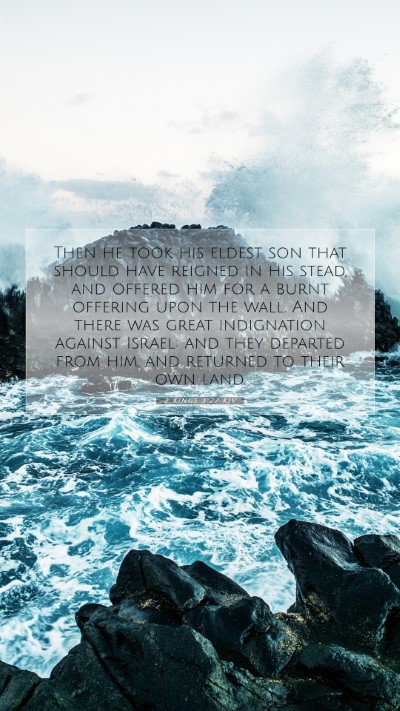Bible Verse Meaning and Commentary on 2 Kings 3:27
Verse: "Then he took his eldest son that should have reigned in his stead, and offered him for a burnt offering upon the wall. And there was great indignation against Israel: and they departed from him, and returned to their own land." (2 Kings 3:27)
Summary of Interpretations
This verse presents a poignant and tragic moment in the narrative of the conflict between the Israelites and Moab. By sacrificing his son, the Moabite king seeks to invoke the favor of his god, showing the depths of desperation and the strong cultural practices of the time.
Historical Context
This event occurs during a time of war when Israel, Judah, and Edom unite against Moab. The siege against Moab leads the king of Moab to this extreme act, which reflects the harsh realities of warfare and the sovereignty of God over nations.
Insights from Commentaries
- Matthew Henry: Henry discusses how this event shows the dire straits that Moab found itself in, leading to an act of desperation. The sacrificing of the king’s eldest son indicates the extreme measures leaders would take in the face of defeat and reflects the religious practices of the time, where such sacrifices were thought to appease deities.
- Albert Barnes: Barnes highlights the significance of this sacrifice as an appeal to God, illustrating the gravity of the situation Moab was in. This act provokes further conflict and division, indicating that such sacrifices are ultimately futile when opposed to God’s plan for his people. He notes the resultant outrage among the Israelites and the spiritual implications of such actions.
- Adam Clarke: Clarke provides an analysis that emphasizes the futility and tragedy of the king's actions. He draws attention to the moral and spiritual degradation that such a sacrifice represents, contrasting it with the steadfastness of the Israelites' faith. Clarke also discusses the implications of such religious practices on communal and national identity.
Theological Significance
This verse stresses the idea of divine judgment and the consequences of turning away from God. The reactions of the Israelites and Moabites highlight themes of loyalty, desperation, and the tragedy of sin.
Application to Daily Life
How do we respond in desperation? This scripture prompts reflection on faith and our trust in divine providence. It challenges the reader to avoid the extremes of our desires and instead rely upon God's plans, which often surpass human understanding.
Bible Study Insights
For those engaged in Bible study groups or seeking Bible study resources, this verse offers a profound lesson in the desperation that can lead individuals to make catastrophic decisions, illustrating the importance of grounding our lives and decisions in faith and understanding God’s will.
Cross References
- Genesis 22:2: The story of Abraham and Isaac, where Abraham is commanded to sacrifice his son, a parallel to themes of sacrifice and faith.
- 2 Kings 3:24-25: Context of the battle against Moab and the events leading to this tragic sacrifice.
- Jeremiah 49:1-5: Prophecies against the nations including Moab, speaking to the consequences of idolatry and rebellion against God.
Conclusion
Understanding Bible verse meanings requires recognizing the historical context and the spiritual narratives at work. The act of the Moabite king serves as a striking reminder of the consequences of desperation and the importance of faith in God’s mercy.


